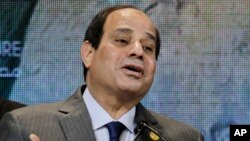Egypt's president said Tuesday he was alarmed by his country's high divorce rate, suggesting a ground-breaking legislation to delegalize divorces verbally declared by Muslim men to their spouses, the latest foray by the general-turned-president into thorny social and cultural issues in the most populous Arab nation.
In a televised address during a ceremony marking Police Day, President Abdel-Fatteh el-Sissi said he has recently learned from the head of the state Statistics Bureau that about 40 percent of Egypt's 900,000 annual marriages end in divorce after five years.
Turning to the Grand Imam of Al-Azhar, the Sunni Muslim world's supreme seat of religious learning in Cairo, he suggested that the legislation should be adopted so a divorce would be legal only if it is done in the presence of a "maazoun," a cleric authorized by the government to officiate marriage and divorce.
Some couples already do that, but many Muslim husbands also divorce verbally - often in the heat of an argument - before later documenting the divorce.
"Why cannot we, as a state concerned with the safeguarding of society ... issue a law that only legalizes divorce when done in the presence of a Maazoun so we can give the couple a chance to reconsider?" said el-Sissi.
"It cannot be just a word that is casually uttered," he said, adding that the proposed law would protect children and prevent what he called "inappropriate behavior." He did not elaborate.
El-Sissi is a devout Muslim who grew up in the medieval part of Islamic Cairo, a spiritual quarter with a large number of historical mosques and shrines. In office since June 2014, his addresses have consistently been peppered with Quranic verses or mentions of God. He has been increasingly assuming a place akin to being "father of the nation" as his government shows less and less tolerance for dissent.
Since he led the military's 2013 ouster of his predecessor - Egypt's first freely elected civilian President Mohamed Morsi - he has overseen the arrest of thousands, mostly Islamists but including hundreds of secular activists too. Outspoken critics of his government in the media have been removed and a clampdown on civil society is in full swing, with travel bans, freezing of assets or intimidating rights groups.
However, his suggestion to delegalize the centuries-old verbal divorce widely seen in conservative and patriarchal Egypt as a male prerogative is a bold reformist move, but also one likely to spark a backlash from conservative clerics and harsh condemnation by militants.
"What do you think, your eminence, the imam?" el-Sissi said with a smile to al-Azhar's grand imam, sheikh Ahmed el-Tayeb, who was present at the ceremony, thus acknowledging that he needs the backing of al-Azhar if the proposed legislation is to be adopted.
El-Sissi has consistently called for moderating Islam's discourse, saying Al-Azhar was the institution best suited for the job. He insists this was needed to improve the image of Islam and rid its teachings from the radical interpretations espoused by militant groups like the sso-called Islamic State (IS).
Egypt's security forces have been battling Islamic militants led by a local IS affiliate in northern Sinai, where attacks have grown deadlier and more widespread since Morsi's ouster. Hundreds of policemen and soldiers have been killed by the militants in the last three years.
"It's a harsh war and the entire world knows that we are fighting it alone," el-Sissi said on Tuesday, debunking occasional assertions by the pro-government media that the militants were on the brink of being vanquished.
As part of his fight against militancy, el-Sissi has recently instructed authorities to standardize Friday sermons in mosques across Egypt, a move designed to prevent militants from sharing their radical interpretation of the faith with the general public.
El-Sissi has in the past also waded into equally thorny issues, speaking strongly against sexual harassment - one of Egypt's chronic social ailments - for example. On his watch, the 596-seat parliament filled with his supporters last year toughened penalties for female genital mutilation, adopting amendments that punish perpetrators with up to 15 years in prison if a child dies and up to seven years for performing the procedure.




